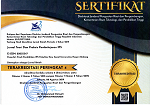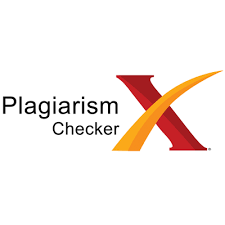Memecahkan masalah geografi melalui problem based learning
Abstract
This study aims to determine the effect of Problem Based Learning model on geography problem-solving sklills. This research model is quasi experiment with non-equivalent control group design. The subjects of the study were the students of XI IPS SMA Negeri 1 Pulau Laut Timur, academic year 2016/2017. The assessment instrument is an essay test based on an indicator of problem solving skills, ie (1) identifying problems; (2) formulate the problem; (3) finding alternative solutions; (4) choose alternative solutions; and (5) make conclusions. Data analysis using independent sample t-test model with 5% significance level. The results showed that there is an influence of PBL model on geography problem-solving sklills. The geography problem-solving skills of experimental class with PBL model is higher than control class with conventional model. Suggestion given, that is to make a plan of learning well and doing learning PBL on outdoor study.
Keywords
Problem Based Learning, problem-solving skills, geography
Full Text:
PDFReferences
Akinoglu & Tandogan. 2007. The Effects of Problem Based Active Learning in Science Education on Student’s Academic Achievement, Attitude, and Concept Learning. Eurasia Journal of Mathematics, Science & Technology Education, No. 1, Hal. 71-81 Th. 2007.
Amir, M. Taufik. 2009. Inovasi Pendidikan Melalui Problem Based Learning (Bagaimana Pendidik Memberdayakan Pemelajar di Era Pengetahuan). Jakarta: Kencana Prenada Media Group.
Anderson, James C. 2007. Effect of Problem-Based Learning on Knowledge Acquisition, Knowledge Retention, and Critical Thinking Ability of Agriculture Students In Urban Schools. Columbia: The Faculty of the Graduate School University of Missouri.
Angkotasan, Nurma. 2014. Keefektifan Model Problem-Based Learning Ditinjau Dari Kemampuan Pemecahan Masalah Matematis. Jurnal Matematika dan Pendidikan Matematika, Vol. 3, No. 1, tahun 2014, halaman 11-16.
Arends, Richard I. 2007. Learning to Teach (Belajar untuk Mengajar). Yogyakarta: Pustaka Pelajar.
Barret, T. 2005. Handbook of Enquiry & Problem Based Learning. Galway: CELT.
Crebert, dkk. 2011. Problem Solving Skills Toolkit, 2nd Edition. Griffith: Griffith University.
Forrester,Victor. 2004. Problem Based Learning: a Problem with Education?. Hong Kong Teachers’ Centre Journal, Vol. 3 tahun 2004.
Funke, Joachim dkk. 2010. PISA 2012 Field Trial Problem Solving Framework (Draft Subject to Possible Revision After The Field Trial). Canberra: Australian Council for Educational Research (ACER, Australia).
Graaff, Erik D. & Kolmos Anette. 2003. Characteristics of Problem-Based Learning. Journal Engng Ed. Vol. 19, No. 5, pp. 657-662, 2003.
Hushman, Glenn & Napper-Owen, Gloria. 2011. Incorporating Problem-based Learning in Physical Education Teacher Education. OPERD Journal, Volume 82 No. 8 Tahun 2011.
Koestiningsih, Noer. 2011. Perbedaan hasil belajar siswa yang belajar dengan menggunakan strategi problem based learning (PBL) dan konvensional siswa kelas X di SMKN 1 Blitar. Malang: Universitas Negeri Malang.
Newman, Mark. 2004. Problem Based Learning: An exploration of the method and evaluation of its effectiveness in a continuing nursing education programme. London: School of Lifelong Learning & Education, Middlesex University.
Polya, G. 1973. How to Solve It. New Jersey: Princeton University Press.
Sahyar & Fitri, Rika Yulia. 2017. The Effect of Problem-Based Learning Model (PBL) and Adversity Quotient (AQ) on Problem-Solving Ability. American Journal of Educational Research, 2017, Vol. 5, No. 2, page 179-183.
Savin-Baden, Maggi & Major, Claire H. 2004. Foundations of Problem-based Learning. London: Open University Press, McGraw-Hill Education.
Refbacks
- There are currently no refbacks.
Editorial and Administration Office:
This Journal is published by Prodi Pendidikan IPS, Fakultas Ilmu Sosial, Universitas Negeri Malang
Semarang St. No. 5 Building I3-102 65145.
Phone. (0341) 551312. line. 376 (19)
Homepage: http://journal2.um.ac.id/index.php/jtppips/index
email: jtp2ips.journal@um.ac.id
JTP2IPS INDEXED BY:
e-ISSN 2503-5347
ISSN 2503-1201
JTP2IPS is licensed by CC BY 4.0.










